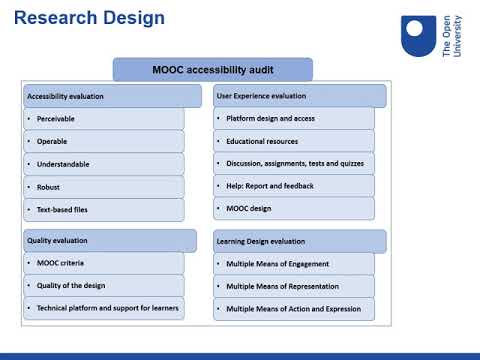Author: Francisco Iniesto
Institution: The Open University
Country: United Kingdom
Topic: Innovation through MOOCs practices
Sector: Lifelong Learning
UNESCO Area of Focus: Inclusive OER
Session Format: Presentation
Abstract
A fundamental characteristic of MOOCs is the high degree of interactivity that facilitates and reinforces the communication between learners. An accessible open e-learning environment should consider each learner’s abilities, learning goals, where learning takes place, and which specific devices the learner uses. Unfortunately, technologies used in MOOC platforms are not necessarily accessible; it has proven challenging to legislate. Literature tells us that there is a lack of understanding of what disabled learners expect from MOOCs. Disabled learners can face difficulties in accessing and using the distinct types of technologies that they come up against, as well different MOOC designs may be affecting their engagement, causing them to miss out on opportunities offered by MOOCs. Unfortunately, extensive studies reporting demographic data in MOOCs seem not to be including disabled learners into consideration. This doctoral research has investigated the current state of accessibility in MOOCs. It involved: (1) Interviews with 26 MOOC stakeholders, e.g. instructional designers and learning media developers who produce the educational resources and accessibility specialists who are part of the platform software development team. (2) Comparative quantitative survey data involving disabled and non-disabled learners participating in 14 FutureLearn MOOCs presentations from the OU; interviews with 15 FutureLearn participants which captured disabled learners’ experiences. (3) An accessibility audit was conducted to evaluate MOOCs from FutureLearn, edX, Coursera and Canvas Network. This audit comprises 4 components: accessibility, user experience (UX), quality and Universal Design for Learning (UDL); experts were part of its design and validation. This research programme has yielded an understanding of how MOOC providers cater for disabled learners, the motivations of disabled learners when taking part in MOOCs, and how MOOCs should be designed to be accessible for disabled learners. A range of barriers to accessibility in the design of MOOCs have been identified and developed recommendations for accessible development of MOOCs. These barriers are not necessarily technical, but include the learning design too and, in addition, these barriers can account for many factors which are not necessarily related to disability. For example, from the learners’ perspective, it is the lack of time to perform the tasks assigned each week; this barrier may be related to a very busy personal life which may affect learners, or it could be due to mental health problems which influence their ability to concentrate on those tasks. Another barrier is related to the different approaches learners have to interact with other peers, something highly influenced when the learner has low self-esteem and is particularly sensitive to receive negative feedback. One of the most common issues raised by providers is the limitation to support learners experiencing accessibility barriers once a MOOC is already online and being run.Keywords
Accessibility, inclusive design, disabled learners


 . Regarding accessibility aspects, in general, you may enjoy the MOOCs from UNED Abierta with the partnership of Fundacion ONCE.
. Regarding accessibility aspects, in general, you may enjoy the MOOCs from UNED Abierta with the partnership of Fundacion ONCE.